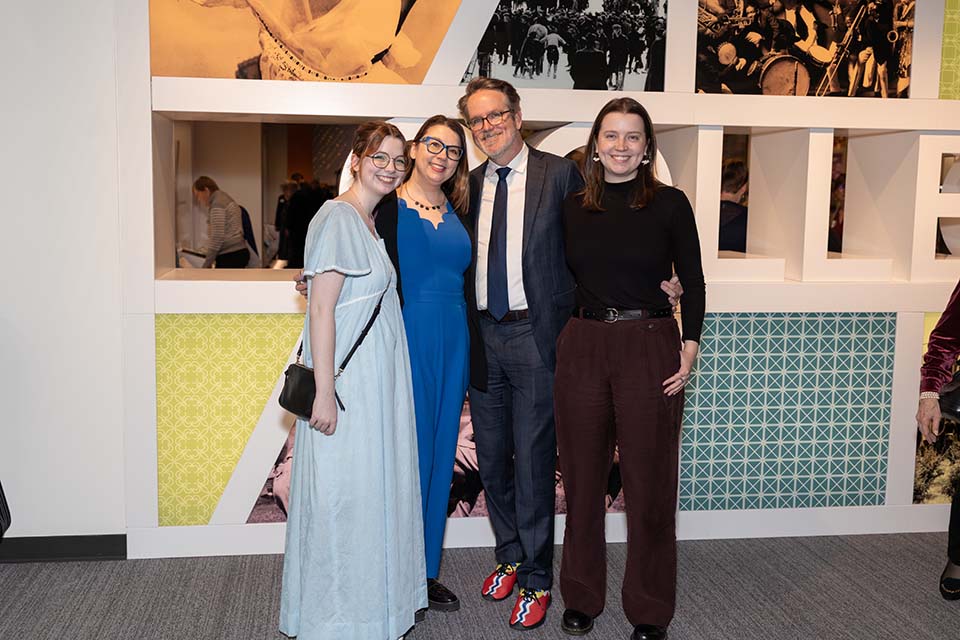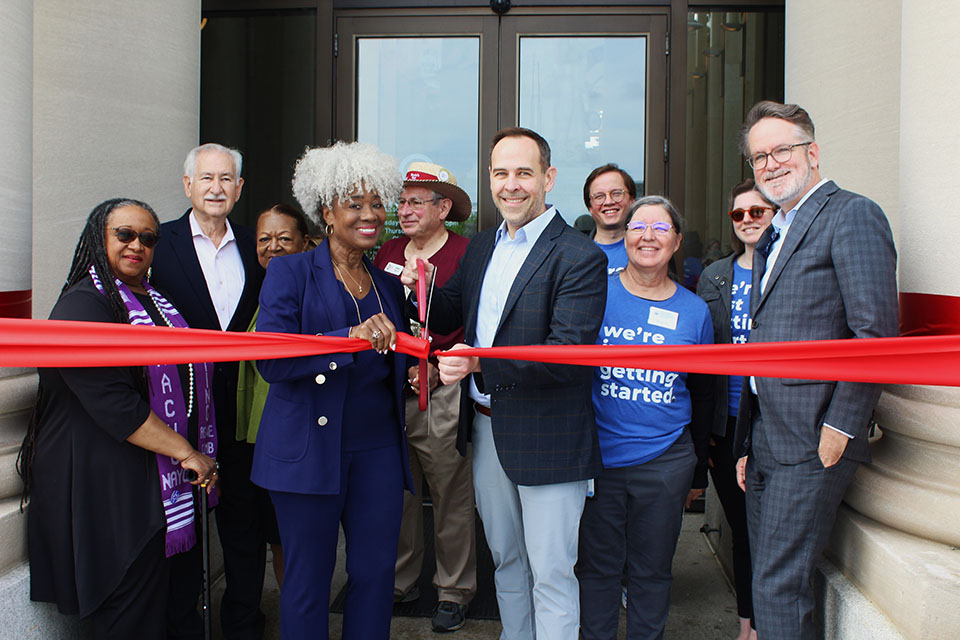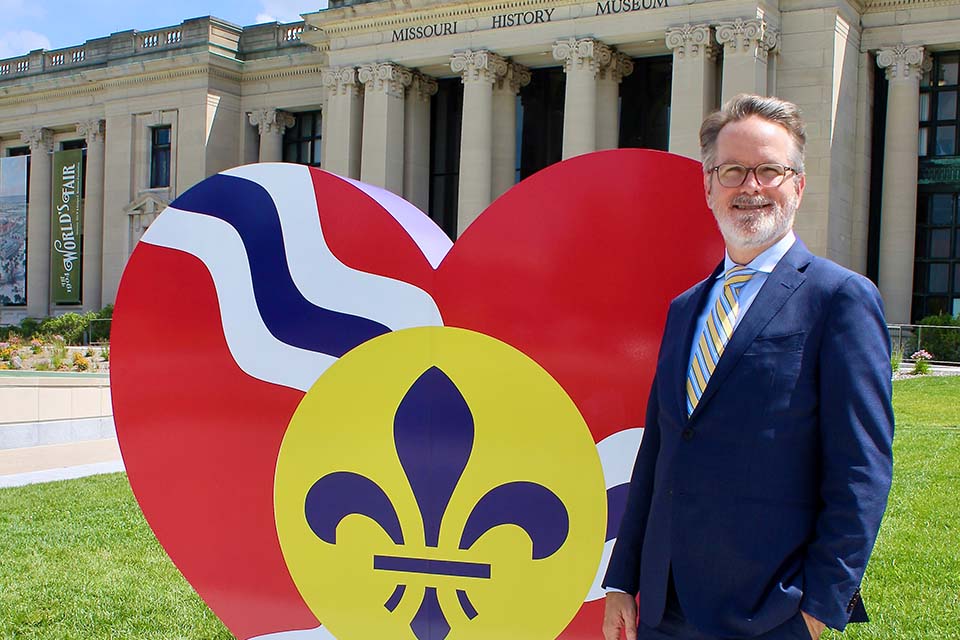Connecting People, History and the St. Louis Community
One of the most rewarding aspects of Jody Sowell’s (GRAD AS ’11) career as a historian, adjunct professor and a former journalist is connecting hundreds of thousands of people each year with a place where everyone can find their own story, he said. Since 2022, the Saint Louis University alumnus has served as the president and chief executive officer of the Missouri Historical Society, where he has worked for the past two decades. Over the years, he has observed a growing hunger in people to learn about what makes their communities unique and to explore the past in an engaging way. As a storyteller and teacher, Sowell said he is thrilled to fulfill this quest for knowledge and connection.
“I’ve seen people leave exhibits and programs with tears in their eyes,” Sowell said. “I’ve watched perfect strangers strike up a conversation based on historic photographs they are looking at. I’ve witnessed students being introduced to the history that happened on the same streets they walk on every day – a history that they most often do not get at school – and have seen how that local connection sparks a deeper interest in the past.”
Sowell became well-acquainted with the power of connecting people with their history while earning his Ph.D. in American studies at Saint Louis University. Previously, he was an assistant professor at the Missouri School of Journalism at the University of Missouri and an editor at the Columbia Missourian when he decided to further pursue teaching at the collegiate level. He sought a doctorate program focused on community-building and civic engagement, and SLU was the ideal choice.
“SLU was the only school I applied to because the work happening in its American studies department was so exciting,” Sowell said. “As I did my research, I was impressed by the professors' intellectual depth and subject range, but was equally impressed by their commitment to their students. It felt like everything I was looking for.”

The Department of American Studies has been equally struck by Sowell’s ongoing commitment to his alma mater and lifelong learning for others.
“Jody was the example of ‘par excellence’ of an interdisciplinary scholar at SLU,” said Matt Mancini, Ph.D., emeritus professor of American studies, who served on Sowell’s dissertation committee. “His scholarship, leadership and clear analysis make him the ideal choice to lead the History Museum.”
Sowell has continued to connect the American studies department to his work in public humanities at the museum, said Heidi Ardizzone, Ph.D., interim chair, internship coordinator and associate professor of the Department of American Studies.
“He has taught a popular public humanities graduate seminar to better support students seeking nonacademic careers in public scholarship, and he was instrumental in creating the History Museum Graduate Fellowship, which funds a SLU American studies doctorate student to work with the museum in building public programming, education materials, exhibits and more,” Ardizzone said.
Thanks in part to his SLU education in the heart of Midtown, Sowell said he “fell in love with” the city, as it offered him a lens through which to better understand urban and American history. Sowell and his family have made St. Louis their home.
Connecting the Historical Dots
Sowell said he believes it is essential for people to seek multiple perspectives to gain a greater understanding of both the past and present and to forge meaningful connections with others.
“Research shows that the more you get to know a place, the more you eat local, the more you take advantage of cultural opportunities, the more you walk in neighborhoods and parks – the more connected you will be to that place,” he said. “You have to discover what makes that place unique. And that starts by exploring it, by getting to know it. The people who make those efforts say they feel a deeper connection to their community and feel less lonely. We know that loneliness can have serious consequences today.”
Ultimately, we want the Missouri Historical Society to be a place where everyone can find their own story. We hope that people see our museums and library as welcoming spaces, where they can explore their own narratives and be introduced to the stories of others. We are all part of the larger St. Louis story.”
Jody Sowell, Ph.D., (GRAD AS ’11)
Another benefit of learning more about a city or community is that it inspires people to find ways to contribute to and improve where they live through work, volunteer efforts and other avenues that create an impact, he said. According to Sowell, it all begins with building a passion for one’s community and discovering what makes it distinctive.
The Missouri Historical Society is one of the largest organizations of its kind in the country and plays a vital role in giving meaning to the Gateway City’s unique, diverse and multifaceted stories.
“Watching people explore St. Louis history and discover things they didn’t know and deepen their passion for this place is a gift I never expected and will never take for granted,” Sowell said. “I’m grateful and honored to work at an institution that makes history come to life this way.”

Sowell said he is proud of the work his team has implemented in recent years to expand the Missouri Historical Society’s offerings and enrich its diverse collections. These include the Chinese-American and African-American history initiatives, the Gateway to Pride LGBTQIA+ collection and the 1904 World’s Fair exhibit. Sowell noted that the historical society has expanded its collections to protect, preserve and share artifacts that have not always been represented in collections nationwide. The efforts are paying off.
“We’ve hosted multiple exhibits about St. Louis history over the past few years that have been so popular that we’ve had to put people in lines and let them in for 10-minute waves due to fire code limitations,” Sowell said. “People waiting in lines to learn about history! I often go up and talk to those groups — I see a captive audience as a chance to engage — and I tell them that while standing in line is no fun, it does my heart good to see so many people eager to explore local history.”
Sowell is currently dedicated to enhancing the historical society’s scope and ability to connect people to St. Louis, including his one-minute “STL History Minute” segments that air on KMOV during CBS Sunday Morning, as well as the new gift shop, Sold on St. Louis, which features more than 200 local makers, many of whom have never had their products sold in a brick-and-mortar shop. He also launched “New to St. Louis: STL 101,” which allows companies to send employees relocating to St. Louis for work to participate in a half-day experience. This program offers a fast-paced presentation about the city’s history, a two-hour area tour and a happy hour where newcomers can meet others who are also new to the community.
“Ultimately,” Sowell said, “we want the Missouri Historical Society to be a place where everyone can find their own story. We hope that people see our museums and library as welcoming spaces, where they can explore their own narratives and be introduced to the stories of others. We are all part of the larger St. Louis story.”
Do you know a SLU alum who deserves a spotlight? Let us know! Email alumni@slu.edu.


















